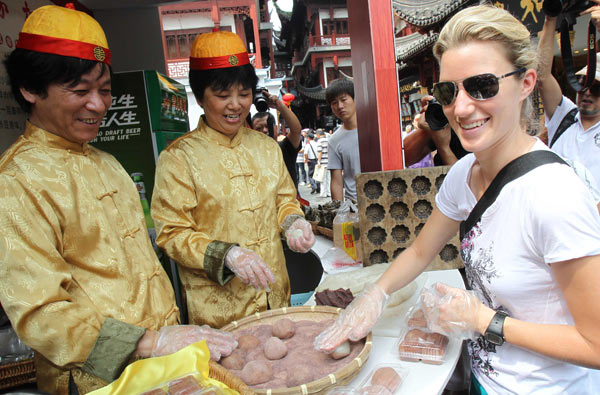Most foreigners in Shanghai see investment opportunity as the city's main attraction, followed by a wealth of job opportunities and a cosmopolitan culture, according to a survey of taxi passengers.

China Daily conducted the poll of 8,717 people in conjunction with Touchmedia, China's leading in-taxi media company, from Friday to Monday.
Of the 1,728 foreigners who live overseas but were visiting the city, 20.5 percent cited prospects for investment as the city's top draw.
Only slightly fewer - 18.4 percent - of the 1,687 expats living in the city who responded gave the same response.
The survey was carried out a month after the opening of the Shanghai (China) Pilot Free Trade Zone in Pudong, which is shaping up as a testing ground for new trade reforms. It is expected to attract more foreign multinationals and banks to the area, and revitalize the logistics industry in the east of the city.
"Although it may not be feasible for a lot of expats here to buy a property in Shanghai - because you need quite a lot of collateral - a number of my friends invest in consortiums that own bars or restaurants," said Lawrence Barrett, a financial services adviser from the United Kingdom. "I was even considering investing in a small business here, like a restaurant, at one point.
"In China, you can have 10 of the same restaurants on one street and they'll all be busy, because there's such a high turnover, whereas in England you can't have that business model."
Foreign direct investment in the city grew 20.5 percent to $15.19 billion in 2012, according to the municipal government, which expects it to accelerate further as the rules concerning the FTZ become more clearly defined.
At the same time, Shanghai's foreign trade saw its first decline in three years to $436.76 billion, marking a drop of 0.2 percent year-on-year, the Shanghai Municipal Statistics Bureau said.
The survey showed that locals hold a different opinion of their hometown. The majority of Shanghai residents said the best thing about their city is all the fun things it has to offer, with 19.1 percent of 2,637 respondents giving this answer, compared to just 9.6 percent who hailed its investment opportunities.
The respective figures for other Chinese residents of the city were similar at 17.5 percent and 10.7 percent.
All of the respondents were allowed to give a maximum of three answers, with the results given equal importance and bundled together.
Foreigners chose Shanghai's cosmopolitan culture as their third-favorite choice (a median 10.6 percent), followed by "lots of fun things to do" (a median 9.1 percent). Expats put high-quality education in fourth place, while visiting foreigners preferred the city's urban construction.
"Job opportunities would be my No 2, but the reason I'm staying here is because of all the fun things to do," said Russ Clarke, an Australian who works in the IT industry.
Barratt, the financial adviser, agreed: "I think the cosmopolitan culture is really a strong one. No matter what job I was doing, I'd still love to live here."
When asked what they saw as the city's signature cuisine, most Shanghai residents said xiaolongbao, steamed buns, while foreigners put hairy crab first, followed by fermented bean curd.
"Hairy crab's good but too rich-tasting. I agree that xiaolongbao is the best Shanghai food. It tastes good," said Kyle Shapiro, of Toronto.
Yu Garden slightly edged The Bund as foreigners' favorite scenic spot, while Qipu Road, a sprawling outdoor market known for its cheap clothing, was almost everyone's top shopping spot.
The only Chinese who disagreed were Shanghai locals. They picked Nanjing Road, known for its luxury stores and designer boutiques.
"Qipu Road wins because it's so big that I can still get lost every time I go there," said New Yorker Nick Perkins, who is studying business here. "It's a good place to go if you don't want to blow a lot of cash."





